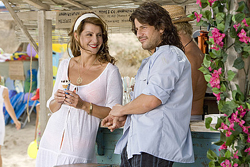My Life in Ruins comes billed as “from the star of My Big Fat Greek Wedding,” but it could just as truthfully be billed as “from the director of How to Lose a Guy in 10 Days.” Both are romantic comedies from about six years ago, and if Greek Wedding put Nia Vardalos on the map with the same basic schtick she reprises in My Life in Ruins, the new film’s randy humor is closer in spirit to director Donald Petrie’s How to Lose a Guy than to the tame PG Greek Wedding.
If in the end My Life in Ruins isn’t as outright unpleasant as How to Lose a Guy, it falls well short of the simple charm of Greek Wedding. Where Greek Wedding offered a satirical take of old-world family ways as fond and familiar as it was stereotyped, My Life in Ruins offers roundly stereotyped caricatures of just about everybody, but without the fondness or familiarity.
Set in Greece, where Vardalos’s character Georgia, an out-of-work Greek-American history professor who has lost her kafe (which seems to be Greek for “mojo”), works at a charter tour agency rather than a travel agency, the movie offers a microcosm of humanity on a tour bus. The movie’s running joke, and it’s not necessarily a bad one, is that tourists are less interested in seeing historically significant sites and learning about culture and history than they are in eating ice cream and shopping for souvenirs.

For Georgia, it is maddening to spend a week trying to enrich and educate tourists who really want to pose for photos with their faces on headless standees of Zeus and Athena and go home with a 50 percent polyester T-shirt with a Trojan horse. “Why,” Georgia wonders, “am I spending my time showing gorgeous ruins to tourists who care nothing about them?” The flip side is the heap of “Average” customer ratings in Georgia’s file, which may suggest that she’s not the most effective history teacher in the world.
In this world, Australians are tipsy beer-drinkers who speak in incomprehensible slang, saying such things as “How many bells you got on the old dickory?” Spanish women are divorced floozies who profess to be “off men” with about as much conviction as a heroin addict declaring this hit his last. Americans are loud, boring boors. Canadians are politely diffident to the point of imbecility. Elderly British women are cheerfully, possibly criminally eccentric. Married couples with teenaged children are miserable. Etc., etc.
In the midst of all this one-dimensionality, Richard Dreyfuss embodies a welcome two dimensions as Irv, a widowed Jewish American who both embodies and subverts the stereotype of the class clown, the jokester who seems to think he’s the life of every party. For harried Georgia, Irv is a thorn in her side, until he slowly reveals another side of his own, eventually becoming a sort of godfather figure to the whole tour bus.
As a character, Irv stands so far above the rest of this lot that he seems almost supernatural; there’s even a running gag about whether he is actually God, or at least a Greek god. Dreyfuss’s humorous, low-key authority is so natural that one can easily imagine the actor playing a similar role on the set.
Unfortunately, Irv is the only character whose stereotype is subverted in any way, or who shows another side. The group bonding that occurs may make the characters fonder of one another, but none of the other tourists brings any additional depth, humanity or wisdom to the table.
Are all tourists really this lame? The movie toys with the idea that Georgia’s tours may be sabotaged by her unprincipled coworker Nico (funny Alistair McGowan), who bribes their boss to give him the “good” groups—as well as the first-class accommodations, while Georgia’s groups are booked at dives where the elevator is broken and the desk clerk leeringly solicits guests for sex in exchange for postage. (This way, we know that all of Greece isn’t as cruddy as what the movie shows us.)

But then it turns out that Nico keeps his tour groups happy by pandering to their yen for ice cream and shopping. Evidently, even “good” tourists aren’t really interested in ancient ruins and history.
Ironically, while paying lip service to Georgia’s high standards, My Life in Ruins really has its sights set on Nico’s lowest-common-denominator approach, treating its audience like insipid tourists. Although the film shoot was granted unprecedented access to shoot in some of Greece’s most historically significant sites, including the Acropolis—and there is some fabulous scenery—there’s little effort to communicate any real sense of the history and significance of the sites.
Greek heritage is reduced to bumper-sticker poetry and cracks about contemporary Greek culture. Greece was “a happening place 2500 years ago,” we’re told. “The birthplace of philosophy, art and democracy … then they discovered the nap.” And quite a bit of fun is poked at the ignorance of the tourists. “I wonder if Jesus ever played here,” someone muses at Olympia, or perhaps it was Delphi, where the Pythian Games were played. (You won’t learn that in the movie.)
I did learn a factoid or two along the way. (Turns out Delphi is pronounced Del-fee, not Del-fie.) Mostly, though, the great thing about Greece is the feeling you get looking at ancient ruins. In the climactic scene in the Acropolis, Georgia waxes eloquent about the sound of the wind whistling between the columns of the Parthenon, “the sound of nature meeting human nature,” or something like that. But the best speech about Greece’s poetic appeal comes from the studly, bohemian bus driver Poupi Kakas (smoldering Alexis Georgoulis), whose name is pronounced like “poopy kakas,” a gag that would have them in stitches on a third-grade field trip.
Okay, enough history and culture. Meanwhile, Georgia hasn’t had sex in forever; the tour bus air conditioning is broken; the bus driver, having not yet revealed studly bohemian side, is hidden under a cataract of facial hair that inexplicably causes everyone to think he’s some sort of missing link; an American wife announces that she’s ovulating “right now” while her nervous husband protests that he can’t perform on command; a sulking teenaged girl hates her parents for fighting, hates the tour, wants to go to the beach, and can only say “This sux”; and a wide-eyed Florida teenaged boy who is not entirely 100 percent sure what country he’s in but is totally stoked to be there doesn’t realize that the Greek phrase on the T-shirt someone gave him is actually a lewd gay come-on, and if you think this isn’t going to end with lip-licking gay mashers hanging all over him, think again.
What’s a repressed Greek-American history teacher–cum–tour guide to do? Clearly, the first thing is to have sex. Despite a rote bit of misdirection involving daisies and a dull-as-dishwater American businessman, it’s pretty obvious, especially once Poupi the bus driver loses the beard, that Georgia will be enjoying the ride with him. Even Georgia eventually figures it out by the scene in which Poupi puts his hand on her breast as a way of telling her to follow her heart, I think. “I know I’m touching your chest,” he assures her, in case there’s any confusion on that point. Well, as long as that’s settled.

Next, how to make history interesting? Tell the dirty stories. Make it sexy, or at least make it romantic—and make it up if you have to.
But the movie can’t even manage this. All we get is Georgia suggestively telling the group that the Delphic oracle may have prophesied naked, and giving a salacious performance as the oracle inviting Zeus to “take my body”—a display which so distracts Poupi that he crashes the bus. According to Wikipedia, the Delphic oracle was originally a virgin, but after she was raped by a pilgrim the office was always held by an elderly woman. Don’t you think that story is more interesting than the one Georgia told?
In another scene, asked about the ruin of a colonnade, Georgia starts to explain about an earthquake. But then, catching herself at a head shake from Irv, she amends that the columns fell over due to “the pull of Ulysses’ love”—a response that apparently charms the tourist. What does that even mean? What does Ulysses have to do with the colonnade? My Life doesn’t tell us. If you can’t tell us a good story, I’d rather know about the earthquake.
A curious subtext of self-criticism runs through Vardalos’s material. Over and over characters tell her, “You’re not funny. Stop trying.” Is it a sort of apology to the audience? Then there’s the line that Poupi passionately delivers just before Georgia succumbs to his blandishments: “Your butt is too small.” Isn’t that just the thing to melt a woman’s heart?
Talk About It
Discussion starters- Have you ever visited a foreign country or historically important site? Have you ever been on a guided tour? Which do you prefer, tours with a guide or sightseeing on your own? Why?
- What do you think of Irv’s “oracles” to his fellow tourists? Can you think of any ways to improve on what he said?
- Why do historical associations and ancient sites matter? Is it important to preserve historically important sites? Why?
- Consider the following from Samuel Johnson (quoted in part in C. S. Lewis’s The Abolition of Man): “Far from me … be such frigid philosophy as may conduct us indifferent and unmoved over any ground which has been dignified by wisdom, bravery or virtue. That man is little to be envied whose patriotism would not gain force upon the plain of Marathon, or whose piety would not grow warmer among the ruins of Iona.” What does he mean? What does this tell us about human experience? Have you ever experienced anything like this?
The Family Corner
For parents to considerMy Life in Ruins is rated PG-13 for “sexual content,” which runs the gamut from suggestive and sexual references and innuendo, to leering, lip-licking come-ons and ogling half-dressed women in the act of changing clothes, to a number of nonmarital hookups (nothing explicit is shown). There’s also a somewhat blasphemous running gag about Dreyfuss’s character possibly being divine.
Photos © Fox Searchlight
Copyright © 2009 Christianity Today. Click for reprint information.











